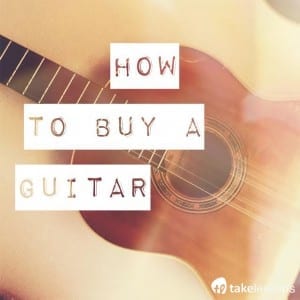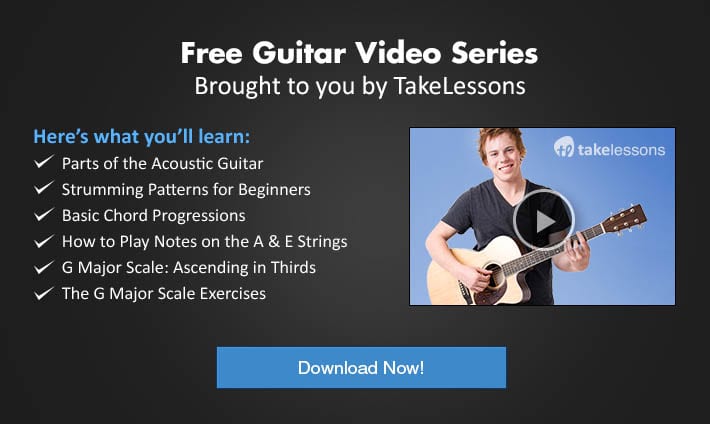 Getting your first guitar is a super exciting milestone in your musical life! If you’ve never made such a big purchase before, you might have a lot of questions about how to buy a guitar. In this guide, we’ll go over the basics so you know where to go, what to look for, and the extras you’ll need to start jamming out.
Getting your first guitar is a super exciting milestone in your musical life! If you’ve never made such a big purchase before, you might have a lot of questions about how to buy a guitar. In this guide, we’ll go over the basics so you know where to go, what to look for, and the extras you’ll need to start jamming out.
What Kind of Guitar Should I Get?
There are two main types of guitars, acoustic and electric. So, what’s the difference between the two and what kind of guitar should you buy?
Most beginners are perfectly happy learning how to play guitar on an acoustic guitar. The acoustic guitar is made of wood and has a hollow body, with a hole cut out underneath the strings. The hollow body of the acoustic guitar is what amplifies its sound. You’ll commonly see folk singers, country musicians, and classical guitarists playing acoustic guitars.
Electric guitars are the cornerstone of rock and roll. You’ll need to buy an amplifier as well if you decide you want to play electric guitar, as these babies don’t make much noise when they’re not plugged in.
It is generally a little bit harder to play an acoustic guitar than an electric as you’ll need to press a little harder on the strings. Many teachers actually recommend starting on acoustic for all guitarists to build finger strength and master technique. The idea being that once you’re able to play an acoustic guitar with ease, picking up an electric will be a breeze.
How Much Does a Guitar Cost?
Depending on what kind of guitar you want and where you go, you can find a guitar at any price point. However, as with all things, the cheapest options are not always the best. Just because you can buy a $5 guitar at a garage sale doesn’t mean that you should.
If you’re just getting started on the guitar, you probably don’t want to buy the most expensive instrument. Luckily, there are many affordable options out there for reliable beginner guitars. Yamaha makes some pretty good acoustic guitars starting around $150, and Fender’s Squire model is a great inexpensive option if you’re looking for your first electric guitar.
Where Should I Buy a Guitar?
Although you can easily buy guitars online, for your first guitar we recommend visiting a local music shop. Take some time to play or hold several different guitars and get a sense of which instrument is the right fit for you.
Guitars can have wider or narrower frets, different sized bodies, and many other variables that might make one guitar more comfortable for you to play than another guitar. Try several guitars both sitting and standing until you find one that feels like it fits your body.
If you have a trusted friend or family member who plays guitar, you might ask them to come with you to help you pick out the right guitar for you. Ask them if there is a brand or local store that they would recommend for you.
Your guitar teacher, they can also be a great resource to help you find the right instrument. Guitar teachers are very familiar with the special needs beginning guitarists have and can give you a good idea of what to look for in a guitar.
Should I Buy a Used Guitar?
For many students, a used guitar can be a great, inexpensive option, as long as the guitar is in good condition. Get familiar with the different parts of the guitar so you can quickly learn how to spot a good used instrument. If you choose to buy a used guitar, here are some things to look for:
- Is the neck straight? Hold the guitar out along the length of your arm and look down the neck. If the neck bows or curves, do not buy the guitar! You’ll want a guitar with a nice straight neck so it stays well-tuned.
- Are the frets worn? If the frets are worn down so that some are higher and some are lower, you’ll have a much harder time getting the right notes and sound out of your instrument. Do not buy a guitar with worn frets.
- Is the body warped? Look at the guitar’s body and notice any bulges, dents or dings. It’s okay if there are some scratches in the pick guard or a chip in the finish here and there. Small marks won’t affect the sound quality of your instrument. However, if you see a bulge near or under the bridge, do not buy that guitar.
What Kinds of Guitar Accessories Do I Need?
Once you’ve found your perfect guitar, you’ll still need to get a few extras so you can get the most out of your instrument. Here’s a quick list of things you’ll need to get started:
- Guitar Picks. Picks come in different shapes, thicknesses, and weights. Beginners usually like lighter, softer picks. If you’re playing for speed, try a heavier pick.
- Guitar Strap. Your local guitar store should have lots of strap options for you to choose from. You can express yourself with a fuzzy leopard strap or go basic with plain leather. The important thing is that your strap allows you to play guitar in a standing position, which is important to practice if you plan to perform standing up.
- Guitar Tuner. Your guitar won’t sound too hot unless you’re able to keep it in tune. There are several different kinds of tuners, so you can pick the tuner that’s best for what you need. Most beginners playing an acoustic guitar are very happy with a chromatic tuner. This type of tuner has a microphone built in and will show you what note you are playing.
- Guitar Case. Depending on what type of guitar you get and where you shop, a case might be included with your purchase. Hard plastic cases and soft fabric cases are both quite common. If you have the option, we recommend a hard case. Hard cases protect your guitar when you are traveling with it and also allow you to store your guitar in a safe place when you’re not playing it.
- Amplifier and Cables. If you’re buying an electric guitar, you’ll need something to plug it into! You can get a small practice amp for around $100 to $200, or spend more on a big monster stack. Just keep your goals and budget in mind and ask questions at the guitar store. Don’t forget to get cables to plug your guitar in to the amp!
Once you’ve got a guitar to call your own, starting private lessons with a great guitar teacher is the next step to success in your musical journey! TakeLessons teachers are available to teach one-on-one lessons in your home, in music studios, and online, so it’s easy for you to find the right teacher for you. Visit TakeLessons today and find your perfect teacher!
You might also like…
–Roadmap of the Notes on a Guitar
–How to Read Guitar Chords
–Play Thousands of Songs Using these Guitar Chord Progressions
Megan L.

